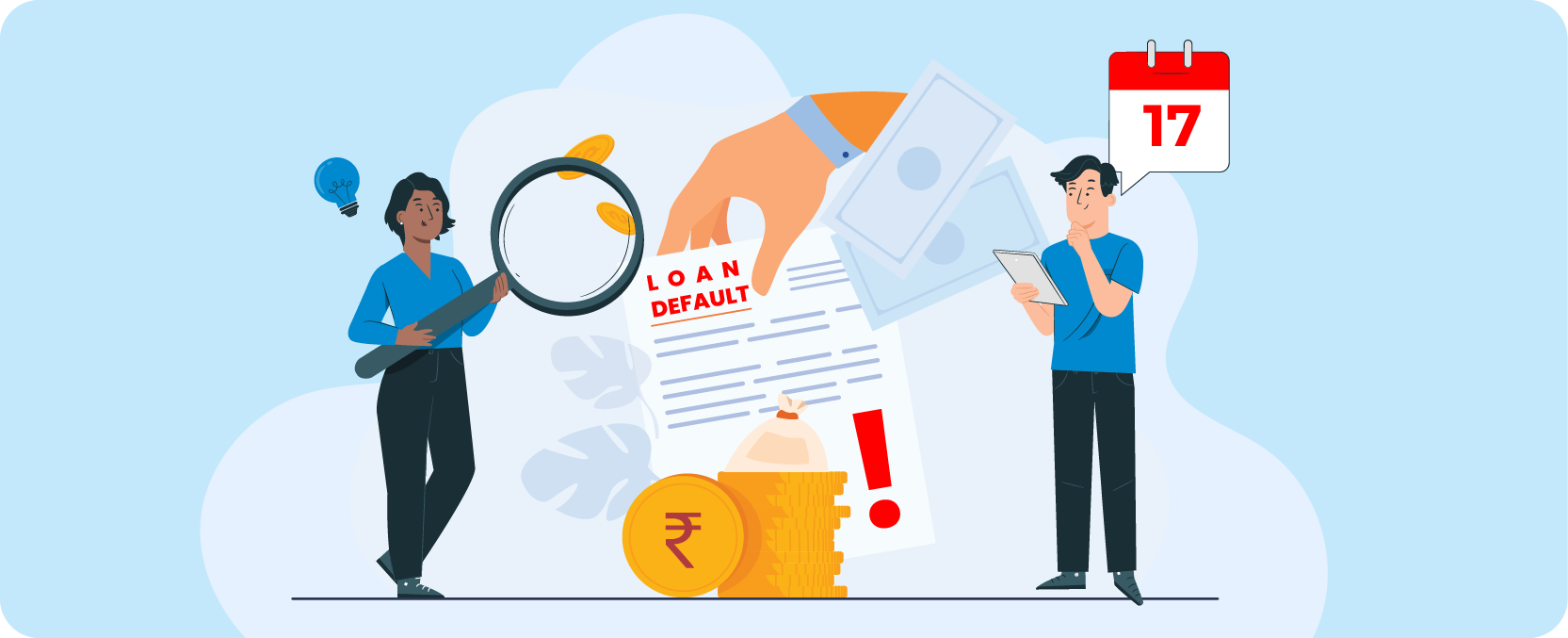- Published on: 20 Oct 2025
- Last updated on: 5 Feb 2026
- Post Views: 21787


Taking a personal loan can be a smart financial decision when you need urgent funds for things like medical emergencies, home renovation, or education. But what happens if you suddenly find yourself unable to repay it?
Defaulting on a personal loan isn’t just about missed EMIs; it can seriously impact your credit score, lead to legal consequences, and make future borrowing much harder. In this blog, we’ll explain exactly what loan default means, what happens when you can’t pay your personal loan, and how you can handle or avoid this situation.
Whether you’ve already missed a payment or are worried you might, this guide will help you understand the risks and the right steps to take, with insights relevant to borrowers in India. Plus, we’ll explore how responsible lending practices, like those followed by DMI Finance, can support you during financial stress.

A personal loan default refers to when you fail to repay your personal loan EMI within the agreed-upon duration. In most cases, if you fail to pay an Equated Monthly Instalment (EMI), the lender will remind you through calls, emails, or messages. When you miss two or three consecutive payments, banks or Non-Banking Financial Companies (NBFCs) will mark your personal loan as “default.”
Reserve Bank of India (RBI) mandates lenders (Banks and NBFCs) to classify a personal loan as defaulted when a borrower misses payments for over 90 consecutive days. When a loan account is classified as default, it affects the borrowers in a number of ways.
Here are the loan default consequences you will face:
1. Your Credit Score Drops
2. You’ll Have to Pay Late Fees
3. Lenders Initiate Recovery Procedures
4. Lender can Initiate Legal Action
5. It Gets Difficult to Get Loans in Future

Under the judiciary, personal loan defaults are considered and treated as civil matters. You can go to jail only when you commit fraud or contempt of court. Here are the legal implications of defaulting on personal loans:
Here are the solutions and tips you can follow to avoid defaulting on personal loans:
Calculate your EMIs: Personal Loan EMI Calculator

Defaulting on a personal loan has many consequences and negative implications. It can lead to recovery proceedings and damage your credit score. However, you can avoid defaulting with simple tips like communication with your lender, requesting a grace period and debt consolidation.
Another way to avoid defaulting is by applying for a low-interest personal loan. At DMI Finance, we offer an easy and convenient personal loan for all your financial needs. While an attractive interest starting at just 14.25% p.a. helps you save on interest, a flexible repayment tenure of up to 48 months helps with repayment. Apply for a personal loan with DMI Finance!
1. Can a personal loan default lead to jail time?
No, defaulting on a personal loan is not a criminal offence, but lenders can take civil legal action to recover the money.
2. Will a single missed EMI affect my credit score?
Yes, even one delayed or missed EMI can lower your credit score, and repeated delays can cause a major drop.
3. How long does a loan default stay on my credit report?
A loan default usually stays on your credit report for up to 7 years from the date of default.
4. What is a personal loan settlement?
A personal loan settlement is when you pay a part of the outstanding amount as a lump sum, and the lender writes off the remaining dues.
5. Will lenders inform my employer about my loan default?
No, lenders cannot inform your employer about your personal loan default. RBI guidelines prohibit aggressive recovery actions such as public humiliation, threats, or intimidation.
6. Can I apply for another personal loan if I’ve already defaulted?
You can, but approval will be difficult, and the interest rate will likely be much higher due to your poor credit history.
7. Can my family be held responsible for my unpaid personal loan?
No, your family members aren’t legally responsible unless they were co-borrowers or guarantors for your loan.
8. Can I remove a default from my credit report?
A personal loan default can stay on your credit history for 7 years. You cannot remove a personal default before its due date, but you can improve your credit score.
9. What should I do if I keep getting calls from recovery agents?
Always communicate politely and note details of the calls, and if calls become abusive, report them to the lender and the banking ombudsman. If the bank doesn’t resolve your complaint, you can file a complaint with the RBI-appointed ombudsman.
10. Can I rebuild my credit score after a loan default?
Yes, by clearing dues, paying all future EMIs on time, and maintaining a good repayment record, your score can improve over time.
| Personal Loan of Different Amounts | ||
| ₹50,000 Personal Loan | ₹1 lakh Personal Loan | ₹2 lakh Personal Loan |
| ₹3 lakh Personal Loan | ₹4 lakh Personal Loan | ₹5 lakh Personal Loan |


